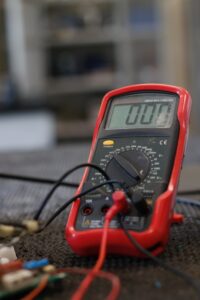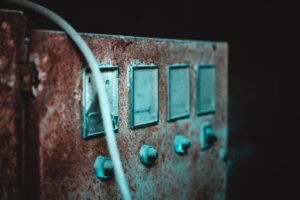Electrical problems in your home can be hidden and suddenly show up when you can’t turn a light on or you see sparks coming from an outlet you use every day.
Many home electrical problems don’t sneak up on you—they show warning signs. You may be able to troubleshoot some of these electrical issues yourself, but you should be cautious when working with electricity. Some problems need diagnosis and repair from a professional electrician. Our preferred contractors are listed here.
Learning the warning signs can help you prevent electrical issues before they become serious. Read on to learn more, blog courtesy of angi.com
 1. Circuit Breaker Problems
1. Circuit Breaker Problems
Circuit breakers trip when there’s an overloaded circuit. By shutting off the electrical supply, breakers prevent wires from overheating and potentially starting a fire. However, breakers can also trip when they are old. While occasional tripping can indicate simple overloads, you should consult an electrician near you if a circuit breaker trips frequently.
Electrical problems in your home can happen when working inside an electrical panel can be dangerous, so you should leave this type of repair to an experienced professional. And you should never replace a circuit breaker or fuse with a higher-rated one, as this can cause overheating and fire.
2. Electrical Shocks
If you notice a shock after crossing a carpeted surface, it may be from static. This is common in the winter and no cause for concern. On the other hand, if you feel a mild shock or tingle when touching an appliance, it could be a warning sign. These shocks often occur because of a ground fault in the appliance or improper electrical wiring.
If an outlet emits frequent electrical shocks, it could be an indicator that something is wrong. You should check with an electrician to make sure that everything is okay. Common causes of sparking outlets include age, exposure to water, and short circuits.
3. Hot Ceiling Fixtures
When looking for electrical problems in your home, you should occasionally check the area around your ceiling light fixtures for warmth. Not all fixtures are well-insulated, and if you exceed the maximum recommended wattage for the bulb, the fixture can overheat. Too much heat buildup could pose a fire hazard.
Switching to compact fluorescent light (CFL) or light-emitting diode (LED) bulbs is one solution to this problem. The bulbs don’t produce as much heat as incandescent bulbs, so they’re less likely to overheat or cause a fire.
4. Flickering Lights

Flickering lights may be a sign of a defective or loose light bulb. If replacing the bulb doesn’t solve the problem, you should consult a licensed electrician. There may be a problem with the light fixture, or the connections to the fixture or your home electrical wiring in the circuit breaker box may be loose. This type of electrical problem requires professional diagnosis to ensure a complete repair.
5. Malfunctioning Light Switches or Outlets
Light switches or outlets that don’t always work are often another sign of a home electrical problem. If you have a malfunctioning switch or outlet, the wiring could be loose or there could be an internal crack in the device.
“If you have an outlet or light that isn’t working, don’t just use another one without getting it checked out,” says Seth Silbaugh, owner of Switched Electric in Modesto, CA. “There’s a reason it isn’t working—and it will only get worse. Ignoring issues can turn a quick and inexpensive repair into a large, expensive issue. In the most serious case, it could lead to a fire.”
Loose plugs in an outlet can also pose electrical problems. If the plug partially falls out, someone could accidentally receive a shock when unplugging the cord. If you suspect that there’s something wrong with a switch or outlet, you should hire a professional electrician to inspect your wiring. They can determine whether any loose connections exist, and replace any defective devices if needed.
6. Burning Odor
If you notice a burning odor coming from any outlets or switches, it could indicate a wiring or overload problem. You should turn the power off at the electrical panel and contact a qualified electrician for appropriate repairs.
A burning smell is a serious issue because it could indicate the start of an electrical fire. Receptacles or connected electrical cords that are warm to the touch are also a sign of an electrical problem.
7. Sparks with electrical problems in your home
Occasional sparks when you first plug in an appliance are normal. However, large or frequent sparks could indicate a problem with your outlet or the circuit. If you hear a popping sound, it could be a sign that a wire is loose. Locating the loose wire in a circuit isn’t always easy, so you may want to seek professional assistance.


